Imagine trying to process the world around you when every sound, sight, and feeling seems turned up to the highest settings possible. This is a reality for some people who have fetal alcohol spectrum disorder (FASD). Like a migraine that can interrupt your executive function (the skills used to manage everyday tasks like making plans, problem solving, and adapting to new situations), this can be a major barrier for some folks to be stable and secure in their housing.
This is why we operate Hope Terrace, a supportive housing building specifically designed for people with FASD. Today, 34 people call Hope Terrace home and are gaining the knowledge and skills to live independently through the support that specifically addresses their unique needs.
The wraparound supports built within the building and its programs helps its tenants overcome their barriers to housing, learn to better manage their day-to-day needs to upkeep their housing, and ultimately gain independence to live with dignity and a good quality of life.
Good Quality of Life Starts with Good Food
When executive function is interrupted, it can be hard to tell what makes for good food that helps with physical and mental health. Hope Terrace’s community kitchen model helps to overcome this barrier by not only ensuring nutritious and delicious food is available to tenants, but that tenants are also empowered to make those choices and learn how to make well balanced meals.
Hope Terrace’s cooking program, called Cook’n’Eat, is supported by the on-staff occupational therapist and teaches interested tenants the basics of cooking, with an emphasis on timing out the different steps to preparing a meal. This helps promote further independence in tenants by teaching a transferable skill that they can apply to many facets of their daily lives.
This is just one of more than a dozen different food support programs at Hope Terrace that teaches tenants how to prepare meal kits, how to serve meals for the whole community, and even how to budget for essentials like groceries. In fact, we’re proud that 85% of the people who call Hope Terrace home are independently grocery shopping on a regular basis and finding better balance with their nutrition and their lives.

Tenant Empowerment through Collective Action
Many of the tenants at Hope Terrace expressed a need for a more prevalent voice in their day-to-day lives and learning how the building they call home operates. Seeing this as an opportunity to further develop transferable skills and independence, a six-person volunteer Tenant Council was formed to act as an intermediary between tenants and what would be considered their landlord at Hope Terrace.
Directly reflecting the needs and wants of the larger Hope Terrace community, this structured group receives feedback from other tenants and creates action plans to address these requests and possibly implement changes to reflect these needs. Recently, this group worked closely with the building and landlord to address some challenges with the heating and successfully uncovered solutions that improved the lives of their neighbours.
This group also acts as a distribution point when Hope Terrace staff has updates or changes they need to communicate to other folks in the building, ensuring there is transparent and healthy flow of information between staff and tenants.
Ensuring Over-Stimulation Can be Easily Managed
While a lot of amazing work can be done to help a person with FASD learn necessary life skills and gain better independence, a few bad moments of over-stimulation can bring back or create new challenges for folks. To ensure this barrier is overcome, we created a room specifically to help quell over-stimulation and balance out tenants’ sensory intake.
Called the Snoozelen, this room has adjustable lighting, sound, visuals, and soft-textured seating to bring down anxiety, stress, and other adverse outcomes that accompany over-stimulation. This has been an incredibly successful tool at Hope Terrace that’s helped tenants manage their emotional well-being long before it becomes a wider issue for other tenants and staff.

There’s Even More to Discover about Hope Terrace
These are just a few of the ways Hope Terrace supports people with FASD in securing and maintaining stable housing. In the past year alone, through the skills and knowledge gained from Hope Terrace’s programs, eight people have moved into fully independent living situations — one is even a proud homeowner.
We’ll be sharing a full presentation on November 21, 2024, in recognition of Housing Month. Join us for this noon-hour webinar session where we’ll go into more details about Hope Terrace — and you’ll have an opportunity to directly ask the people running Hope Terrace more about what makes this building so successful at helping people with FASD overcome their unique barrier to stable and secure housing.

Ten years ago, RJ Formanek wanted to start a conversation about Fetal Alcohol Spectrum Disorder (FASD). As an adult who has FASD, he thought educating people and showcasing his diverse skillset and reliance was important. And the Red Shoe Walk was born.
RJ figured he should stand out – red shoes did the trick. With his crimson kicks, RJ took to the street, stopping to talk with anyone willing to learn about FASD. And no wonder he wanted to start a conversation about FASD – especially when it feels like no one is talking about FASD.
This year, our Red Shoe Day Event sees us walking from Hope Terrace, our supportive living apartment for folks with FASD, through the King Edward Park community, and all through Bonnie Doon and into Strathcona and then returning to have lunch and an art sale at the Shamrock Curling Club. The art sale will feature artists who have FASD. Register today to join us on September 9 from 10:30 a.m. to 2:00 p.m. for a Red Shoe Walk through the community and bring awareness to a disorder that needs to be talked about more.
4% of Canada’s population has FASD
There are more people in Canada who have FASD than autism, cerebral palsy, and Down syndrome combined. And no two people who have FASD are alike. Many people who have FASD have rewarding careers and fulfilling lives – they uncover their strengths and lean on them to find success.
FASD affects people differently depending on when alcohol was introduced to their fetal development. Alcohol slows down development, both physically and mentally. This means how FASD affects a person is highly individualized, often requiring individualized programs and supports to help them live with dignity.
FASD is a hidden disability as most people who have FASD have no physical signs of impairments. Adolescents and adults who have FASD can experience high rates of difficulties in daily living and adverse outcomes, including school disruption, mental health issues, and challenges with independence. This is why the Red Shoe Walk is so important.

There is shame in an FASD diagnosis
Often, people miss or never receive an FASD diagnosis because of the shame involved – not on the people who have FASD, but on those who carried them in utero. There are ad campaigns and information packages all over highlighting the risks of drinking alcohol while pregnant.
A person may consume alcohol while pregnant without ever knowing they’re affecting the fetus they carry. They may not know they’re pregnant, have been told a little alcohol doesn’t hurt, come from a community where that information isn’t available, are experiencing mental health or stress-related illnesses prompting them to drink, or for many other reasons that have nothing to do with other issues like poverty. With a better understanding of how a person can end up consuming alcohol while pregnant, we can better understand FASD.
FASD can affect anyone – not only people in poverty
A common misconception around FASD is it only affects people experiencing poverty – we know this is false. People who have FASD can come from a range of backgrounds and situations, sometimes even from affluent families. We’ve seen this firsthand at Bissell Centre with participants in different programs telling us their stories and experiences.
Where the issue around poverty gets cloudy is how people who have FASD can be more likely to experience houselessness. That difference in understanding and mental processing can make navigating systems that we take for granted more difficult. We designed our programs specifically with this in mind – ensuring that services for folks who have FASD are readily available no matter the individuals’ personal circumstances.
Helping people live with dignity
Our Fetal Alcohol Spectrum of Services (FASS) program works to understand individuals who have FASD as whole people. We work one-on-one with our program participants to identify their unique strengths to guide them toward personal fulfillment.
Part of our FASS program is Hope Terrace. This is a supportive housing building specifically designed for people who have FASD. Wraparound services for FASD are included in this building, which also features a Snoezelen room to help individuals with emotional regulation.
Recently, a group from our FASS program contributed to the book Born Broken, detailing what our participants found most important to them in their own voices. This book highlights what folks who have FASD have to offer the world, their fears and struggles, and how they’re moving forward.
Maybe no one is talking about FASD simply because they don’t understand it. On September 9, keep an eye out for some folks walking all in Red Shoes. Ask questions about FASD and the Red Shoe Walk to ensure we are all talking about FASD.

Individuals connected to our Fetal Alcohol Spectrum of Services (FASS) program contributed to a book about the challenges and realities of navigating life with Fetal Alcohol Spectrum Disorder (FASD). Under the guidance of Jared Epp, Carleton University PhD candidate and former housing support worker with Bissell Centre, who facilitated the group in sharing stories of what was most important to them. Fifteen people shared their stories, captured in this captivating collection. Born Broken is a book that’s an immersive experience into what it means to have FASD and the barriers it can create.
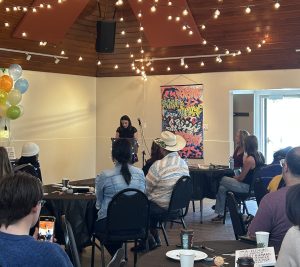
The group celebrated the release of this Born Broken book this past month with a small and intimate reading and sharing. Everyone who contributed to the book received a copy, and a few were shared around the community to help spread its positive message.
Copies of Born Broken books are available to purchase from the Bissell Thrift Shop on 118 Avenue or Paper Birch Books at 10825 95 Street.
Below is the preface to the book, written by Jared Epp. This firsthand experience of seeing the collection come together illuminated the importance of this book for the contributors and for those about to read it and gain a better understanding of FASD.
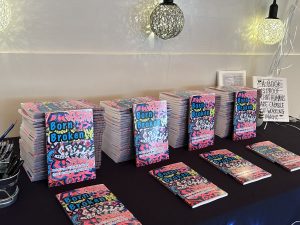
Preface from Born Broken
A group of individuals connected to Bissell Centre’s Fetal Alcohol Spectrum of Services (FASS) came together for a book project. The goal was to provide an opportunity for folks to share whatever kind of content they wanted. Leaving it open-ended allowed the individuals participating in the project to share what was meaningful to them. Their contributions didn’t have to only be about living with Fetal Alcohol Spectrum Disorder (FASD). A number of contributors did want to share their stories about living with FAD, about their daily challenges, as well as the impact of receiving their diagnosis. Others talked about different things. There are stories about adventure on Edmonton’s public transit, sewing denim, dreaming, making music and art, the challenges of finding and keeping a job and many other events and situations the reader will soon encounter.
Woven throughout the book are stories, ideas, frustrations, thoughts and reflections, offering a window into the experience of entering into the world a certain way.
In our last group meeting, we had to come up with a title for the book. Each contributor present was invited to come up with some titles, and then there would be a vote.
These were the title ideas:
- Born Broken
- The Struggle is Real
- Drumbeats of Hope
- Light in the Dark
- Perfectly Imperfect
- Getting Dealt a Bad Hand
Everyone had agreed on Heidi’s subtitle, “Reflections on Life and Resiliency from Individuals living with FASD,” as it put a positive spin on the main title.
Born Broken won by one vote over The Struggle is Real and Light in the Dark. There was a lot of discussion and debate on the chosen title. Some people felt it was too negative, but they also acknowledged it’s sentiment. In many ways, the titles and the debate around it set a theme that echoes through each story: individuals confronting and overcoming something they were born with, have no control over, and yet seems invisible to those outside the lived experience of FASD. The reader is invited to encounter the diverse contributions within the book, keeping in mind the unsettled nature of its title and the realities of living with FASD.
-Jared Epp

When we hear about FASD (Fetal Alcohol Spectrum Disorder) we often hear about the challenges and negative impacts on society. While there are challenges with this diagnosis, there are also plenty of positive traits and strengths to counteract the negatives that are more often discussed.
When thinking about individuals who are living with FASD, we need to take a people-first approach. There’s a great deal to learn about FASD. No diagnosis is the same; each individual experiences FASD differently and every individual can still live a full, robust life in the community with the right supports. Sound familiar? This is inherently true for every single human experience on this planet. A diagnosis shouldn’t create an “us” vs “them” narrative that builds walls between us. What it should do is encourage empathy and compassion.
Even the most neurotypical people benefit from focusing on their individual strengths. We talk about “math people” or being a “people person” all the time. We classify ourselves and others as introverts and extroverts and people who make decisions based on their hearts or their heads. Neurodivergent individuals have all the same strengths, desires, wants and needs as anyone else. They also require supports from their community, friends, and family just like the rest of us.
Take JB, for example. This participant’s personal neurological FASD strengths come out when routine, order, and a fixed process are in place. He also thrives when incorporating movement into an activity. The participant applies these strengths to fixing bikes and shows significant skill in doing so. He has expanded his skills, using them to support the community by fixing broken walkers for people who are unable to access funding for walking aids. JB gets assistance sourcing the walkers, fixes them on his own time and then gives them back to be distributed in the community. In this way, he utilizes his neurological strengths to contribute uniquely to his community.
And then there’s KR – This participant’s social strengths allow her to be focused on those around her and sensitive to the needs of others. Utilizing this strength, she has supported occupational therapy students in understanding the strengths and challenges she has observed in herself and others with FASD. KR benefits from the use of organizational supports and pre-planning around sequences to support her cognition and prevent rushing, which can lead to feelings of frustration and make her more likely to make mistakes. As a result, the participant chose to teach the students through a pre-planned presentation using posters; this allowed her to best utilize her FASD strengths. In this way, KR is able to coach future occupational therapists on how to approach clients in her situation in a client-centred way that is more likely to lead to therapeutic success.
For other individuals learning to manage their FASD, starting with strengths has been a pathway through. One participant, JR, is skilled at repairing bikes but prefers to keep to himself and limit social situations. JR uses his strengths to contribute to his community by fixing bikes for Ukrainian refugees in his home.
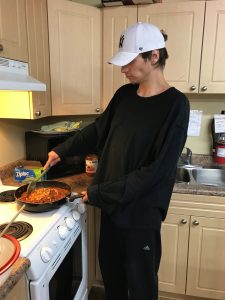
Then there is JW – This participant is strongest in an environment that has limited distractions, where information is presented 1-2 steps at a time and ideally is in a visual format. He also benefits from flexibility in time scheduling and is very creative. For him, a strength-focused approach is to channel this creativity through cooking. He frequently creates new flavours and recipes to share with the residents of his community.
Ultimately, if you boil these strengths and needs down, many of us can relate. We too benefit from routine, consistency and environments with few distractions. While many of us face a variety of challenges in our lives, in our strengths we are alike. Central to this are the supports in the community that we all need to live a full and prosperous life. People with a diagnosis of FASD often face stigma when, in actuality, we are far more similar than we may think. Some of us just need a little more support than others or different support to truly let our strengths shine.
We invite you to learn more about FASD over the month of September and beyond. Let’s come together to create an equitable space together and foster an understanding of the challenges and strengths that our fellow community members live with.
My name is Chance. I’m 25 years old and live at Hope Terrace, a permanent supportive home that is run by Bissell Centre. I have Fetal Alcohol Spectrum Disorder—a type of brain injury with no cure—so I need help with things like coping with my emotions, keeping appointments, and cooking.
Before I moved into the Hope Terrace residence, life was frustrating and stressful. I used to live at my grandmother’s house, along with my mom and four other family members. When everyone was home, it was chaos, which made it even harder to manage my emotions—even happy emotions were too much at times.
A lot of times, I would blackout because my emotions got too intense. I do my best to keep my anxiety and bipolar symptoms under control, but it can feel impossible without proper support.
Mom and I knew I needed help, but we didn’t have money and we didn’t know where to start. So, a few years ago, I tagged along with my friend to Bissell Centre’s Easter meal. He was getting help from Bissell and seemed to like it enough. Maybe I could get help too?
It was at that very meal that I first heard about Bissell’s mental health resources and the Hope Terrace house.
When I was invited to move into Hope Terrace a few months later, Mom and I both agreed it would be a good decision. I finally felt some hope. Maybe life doesn’t have to be so hard all the time? Maybe I could have a better life?
The staff here help me with the things that overwhelm me most—like budgeting, cooking, and dealing with my emotions. They are awesome! They’re really good, kind people—they’re my family.
Without the support that I regularly get here, I don’t know where I’d be.
—Chance, Bissell Centre Participant
September is Fetal Alcohol Spectrum Disorder (FASD) month. Since 1999, FASD activists have held World FASD Awareness Day events on 09/09 to represent the nine months of pregnancy, often highlighted with a bell-ringing ceremony at 9:09 am. FASD is a lifelong disorder that affects people from all walks of life. It occurs as a result of prenatal alcohol exposure (PAE) and can result in a range of disabilities. In Alberta alone, approximately 46,000 individuals are currently impacted by FASD. Adults living with FASD face challenges daily due to the invisible nature of the disability impacting executive functions in the brain. Individuals with FASD often experience challenges with motor skills, daily living skills, emotional regulation, physical health, learning, attention, communication, memory, and social skills. Supporting people with FASD, through community support and on-site services can help them live independent and sustainable lives. Here at Bissell Centre we use a Person-Centered Planning approach in a holistic manner to provide a variety of services to support men and women with FASD.
FASD is a spectrum disorder that affects each individual differently.
Bissell Centre understands that FASD is a spectrum disorder that affects each individual differently. We strive to offer a variety of supports that accommodate the uniqueness of each person. Our Parent Child Advocacy Program (PCAP) is for pregnant women or those up to 6 months postpartum who are at high risk of using substances. PCAP helps them have healthy pregnancies, healthy babies, and healthier post-partum outcomes. The PCAP model is focused on harm reduction and is not abstinence based, though that may be a goal. The Adult Advocacy program provides outreach services to individuals with FASD, meeting them where they are at, brokering connections to government and community resources, and encouraging familial connections. Both programs follow a three year progression – the first year is building a therapeutic relationship with the advocate, the second year is interdependence, and the third year is successfully transitioning in to the community at large. Hope Terrace is a Permanent Supportive Housing program (PSH) where trained and equipped Bissell Centre staff provide a respectful, collaborative, and non-judgmental approach when interacting with residents under a harm reduction philosophy. The goal of Hope Terrace is to provide stable housing for individuals that have experienced chronic episodes of being houseless. Through on-site supports such as 24/7 Personal Support Workers, a Mental Health and Addictions Coordinator, and an Occupational therapist we are able to provide a holistic approach in order to achieve stable, permanent housing for our individuals that experience being houseless due to the complex nature of FASD.
Bissell Centre also focuses on increasing FASD knowledge and understanding within the community of support workers and other stakeholders, such as the police and emergency services. We organize and facilitate monthly FASD Frontline meetings where workers can bring challenges, issues, and concerns to the table to brainstorm around best strategies and practices to support people with FASD. These meetings help prevent information silos and enable networking opportunities. As well as have presenters come in to speak about programs and topics that are relevant to the work that the frontline workers do, which may supplement their resource knowledge.
It is through these programs that we can empower individuals who are living with Fetal Alcohol Spectrum Disorder (FASD).
Thanks to our incredible supporters, we were able to implement positive changes and saw huge successes that truly impacted the people we served this year! Here are some of our favourite moments of 2017.
1) Struggling Families Treated to More Summer Camp Experiences
Moonlight Bay Centre, our camp site at Lake Wabamun, has been a place of solace, rest, and rejuvenation for struggling families. Through traditional summer camp activities, kids and adults alike made meaningful connections while enjoying a respite from the stress of city life. This year, we offered six 4-day camps, enabling us to host 143 people, including 51 children.

2) Financial Empowerment Program Launched
In partnership with E4C and the Institute for the Advancement of Aboriginal Women, Bissell launched its Financial Empowerment Services. This national program strives to improve the financial well-being of people with low incomes through education, coaching, and supports. We are seeing more people filing their taxes than ever before!
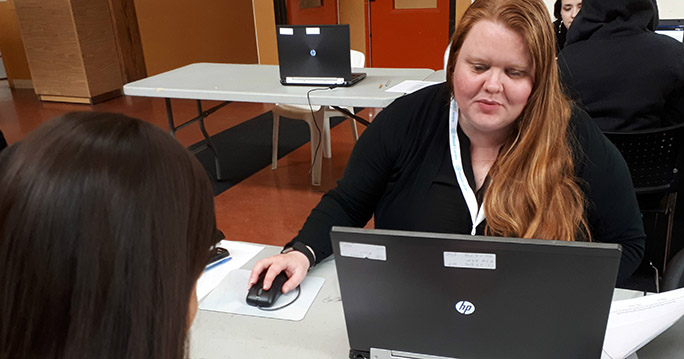
3) Bissell’s Expanded Outreach Housing Team Houses More People than Ever
Our Outreach Housing team alone helped 55 people, including 19 children, find permanent homes in October. This was a record number of people supported in a single month! To date, with the assistance of our housing services teams, approximately 345 people have been housed this year, and 318 adults, parents, and children avoided eviction with support from our Community Bridge team.

4) Neighbours Come Together to Commemorate National Indigenous Peoples Day
National Indigenous Peoples Day is held across Canada every year to celebrate and recognize the unique cultural heritage of First Nations, Inuit, and Metis Peoples. Many of our friends and neighbours gathered at Bissell to enjoy singing, dancing, drumming from various indigenous backgrounds, along with stew and bannock meals, traditional arts activities, and more!

5) Renovations Commence to Improve Access to Supports
Bissell Centre has operated drop-in services for over a hundred years as a means of engaging with individuals who struggle with homelessness and poverty. We received funding to renovate our communal space in order to improve our clients’ ability to access the services they need to meet basic needs, obtain critical supports, develop skills, and build relationships. We’re excited to implement our service model and take another step toward eliminating poverty in our community.
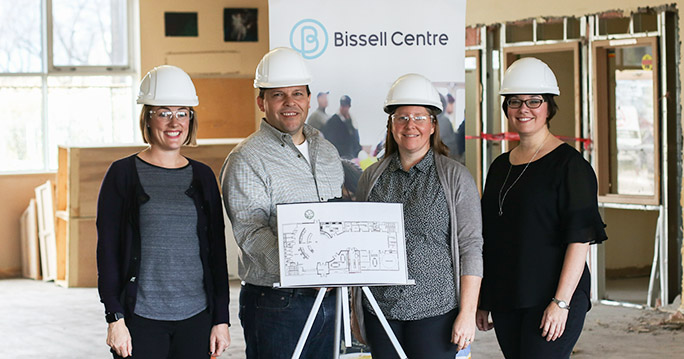
6) Bissell Introduces FASD Medic Alert Bracelets
In October, our Fetal Alcohol Spectrum of Services team launched MedicAlert’s pilot FASD bracelet program at Bissell. The program aims to achieve more equitable treatment for persons living with a Fetal Alcohol Spectrum Disorder by raising awareness among emergency first responders on how to approach these individuals as identified through their MedicAlert ID.
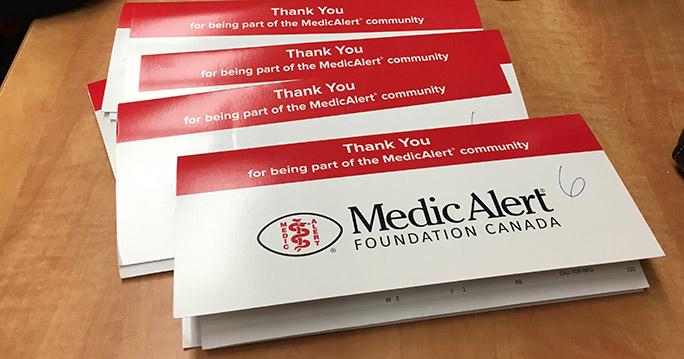
7) Bissell Donors and Volunteers Bring Joy to People in Need During the Festive Season
Five hundred and ninety three Bissell Elf volunteers helped make this Christmas season especially warm and friendly! Two hundred and fifty heaping plates of turkey, vegetables, stuffing, and salad were served at our Christmas meal, 143 families received gifts through our Festive Giveaway event, and 228 people helped wrap gifts to raise funds for Bissell’s programs and services during our Gift Wrap for Bissell events. Thank you to each and every person who helped bring comfort and joy to the people who lean on Bissell Centre for support over the holidays!
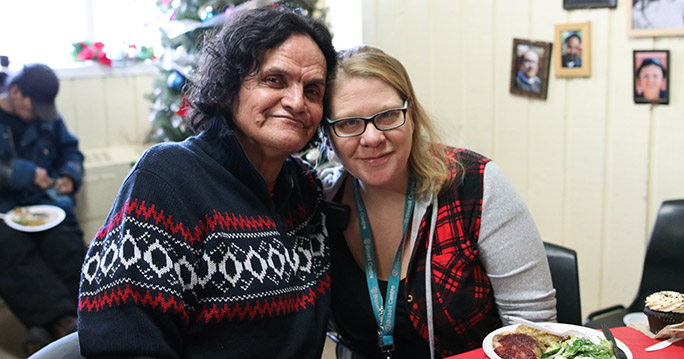
As we look back on 2017, we are reminded that the work that we do at Bissell Centre would never be possible without your support.
THANK YOU, from the bottom of our hearts!
Help create more memories like these by joining our family of supporters today. Make a donation.
International FASD Awareness Day is observed every year on September 9th around the world with events to raise awareness about the dangers of women drinking during pregnancy and the problems associated with the mental and physical development of their children. FASD is one of the leading causes of birth defects in children that affect their physical, behavioral, and cognitive development. Approximately nine out of every 1,000 children born in Canada are affected by FASD or roughly 1% of the population.
Through community development, advocacy and intensive supports, Bissell Centre’s Fetal Alcohol Spectrum of Services (FASS) program enhances the community’s capacity to understand and prevent FASD, and support the well-being of individuals and families affected by FASD.
On September 9th, Bissell Centre is taking part in the 15th Annual Mocktail Madness event hosted by the Edmonton and area Fetal Alcohol Network (EFAN) to help raise awareness about FASD.
For more information about FASD Awareness Day, please visit www.fasday.com and to learn more about Bissell Centre’s FASS program, please visit our FASS program page.
[youtube https://www.youtube.com/watch?v=t1D7g2NoESE&w=500&h=312]
On Friday, September 7th at 12:09pm Bissell Centre staff, along with EFAN and many others, performed a Flash mob dance to our song “You Can Choose” from our rap video. 
September 9th was International Fetal Alcohol Spectrum Disorder Awareness Day. We want everyone to know that FASD is 100% preventable if women avoid the use of alcohol during pregnancy.
Did you know that FASD affects more than 36,000 Albertans who may need services and supports that can cost up to $1.8 million each?
There are 12 FASD Service Networks that offer services and lifetime supports to Albertans with FASD and their caregivers.
Help make a difference. Register today for the Alberta FASD Conference being held in Edmonton October 22-23 http://bit.ly/QjPG1z
View our new FASD awareness music video
[youtube=”http://youtu.be/t1D7g2NoESE”]
From the creative musical minds of PlanIt Sound – http://www.planitsound.com
Music Performed by Fred Brenton
Video Produced and Directed by Blake McWilliam
Video Director of Photography Mike McLaughlin
Featured Artists – Omar Mouallem (AOK), Manuela Wuthrich and R.J. Cui
Introducing Bissell Centre’s very first FASD Awareness Ringtone! Be one of the first to have this modern new ringtone! Just follow the instructions below using the appropriate links.
Instructions on downloading the new ringtone to your phone
iPhone Users – You Can Choose Ringtone
Step 1. Import the M4R song file into iTunes on your computer (save it somewhere and then drag & dop)
Step 2. Synchronize the ringtone file from the Ringtone folder on the left to your iPhone
Step 3. After completing the sync, tap the settings on the iPhone
Step4. Tap Sound – Tap Ringtone
Step 5. Select the ringtone from Custom. (* Song titles may not be recognized when only written in Roman alphabet)
Blackberry Users – You Can Choose_BISSELL CENTRE RINGTONE MP3 BLACKBERRY
1. Open the attachments on your Blackberry phone device
2. Save the MP3 attachment by “checking” the box that says “save as ringtone”
3. Set your phone to audible ringtone, and have someone call you to test it out!
Unveiling for the first time – You Can Choose – an FASD Music Video by Bissell Centre, EFAN and PlanIt Sound
Our new music video!
[youtube=”http://youtu.be/t1D7g2NoESE”]
Our new educational video!
[youtube=”http://youtu.be/vHSllqBVA8c”]

















